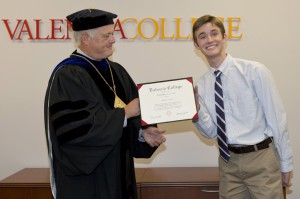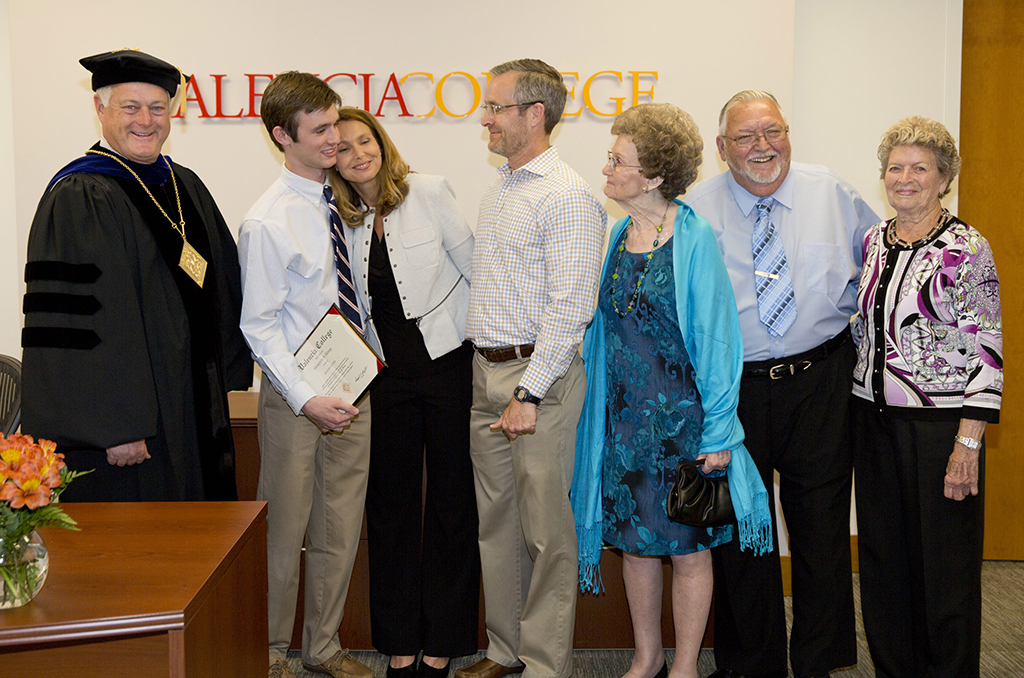Hampton Hovey marked a happy occasion last week – one that some doubters thought would never come.
He graduated from Valencia College – and was handed his associate in arts degree by Dr. Sandy Shugart, Valencia’s president.
What makes Hampton’s story remarkable is this: Fourteen years ago, when Hampton was a preschooler, a school psychologist told his parents that it was unlikely he would even graduate from high school, let alone attend college.
Stunned by her opinion, Greg and Patti Hovey began looking for other options — and other opinions. They hired an independent child psychologist, who spent eight hours testing him and said Hampton probably had “pervasive developmental disorder.”
But Hampton, she told them, has a quick mind. He just has trouble communicating what he’s thinking.
“He has a brain like a Pentium 4 processor and a dot-matrix printer when it comes to speaking and writing,” she told his worried parents.
Armed with that knowledge but no real idea how to proceed, the Hoveys set about to figure out how to help Hampton overcome his challenges. They tried the public schools, and speech and language therapy. And, along the way, they began to unravel his learning disabilities. They discovered that Hampton has dyslexia, dysgraphia and auditory challenges.
When he was in third grade, they sent him to a private school, Central Florida Christian Academy, where there was a learning-disabled program integrated into the classroom.
“When you have a child who’s learning disabled, there’s no roadmap,” said Patti Hovey. “Every child is unique. And as a parent, it’s gut-wrenching because you try so many things and it may or may not work.”
But the private school, as well as hard work and encouragement, helped. By the time he was a senior in high school, Hampton had a 3.5 GPA and was taking Advanced Placement classes.
When it came time to talk about college, however, the Hoveys were reticent. They wanted Hampton to reach for the stars, but his history had taught them to move slowly and cautiously. “It always works best when you introduce things slowly to him – gradually,” said Greg Hovey.
Uncertain about how to proceed, they met Dr. Shugart one afternoon at a golf course—and over a Coca-Cola, Hampton, his dad and Shugart talked about college and how Hampton might benefit from starting at Valencia.

So, the summer after graduation, Hampton – who’d just passed his driver’s test and received his driver’s license – began taking classes at Valencia’s West Campus. To be precise, he started with one class, a humanities class, to get his feet wet. “Frankly, we had anxiety about him driving to Valencia every day, finding his way there and finding the classroom,” says his mom.
As for Hampton, he thought Valencia made a lot of sense. “It was close to home and a good first step,” he says. “I could still live at home and figure out this college thing.”
At Valencia, Hampton not only succeeded – earning As and Bs in his classes – but thrived. When he struggled with writing, he turned to the Writing Center, where they helped him spot his errors (difficult for someone with dyslexia). He also worked with the team at the Office of Student Disabilities to get accommodations from professors, such as sitting near the front of the class to avoid distractions. And because he has trouble writing, he was allowed more time to take tests, particularly in courses in which the exams included essays.
“I have dysgraphia – I’ve always had chronic ‘doctor handwriting,’ “ he says, laughing. “ It’s been hard for me and my teachers. I can’t read my notes and they can’t read my essays!”
He uses technology – special computer programs and a smart pen – to help with his learning disabilities. But Hampton also has a secret weapon: He disarms people with his sense of humor. “I like to make jokes in class,” he says, laughing, “though I don’t think my professors always appreciated them.”
Though he was nervous about college, Hampton did well, even in Spanish, which he’d always viewed with trepidation. “When I was diagnosed with dyslexia, they were worried about me learning English, much less a foreign language,” Hampton says. But his Valencia Spanish professor, Aida Diaz, is married to a man with dyslexia – and she gave Hampton confidence that he could learn the language. She also encouraged him to join study groups, where he connected with friends.
An avid fan of history, Hampton loves history classes (one of his favorite classes was Prof. Paul Licata’s class on the literature of the Holocaust) — and he often read the whole textbook before classes began. He also managed to get out of his comfort zone. For instance, he drove to East Campus to take a theater class for fun – and juggled classes while working part-time at Sea World.
“Other students have worse situations,” says Hampton, who’s now 20. “They have full-time jobs and a lot of the students have more issues than me. So I’m not complaining.”
Today, Hampton is in his first semester at the University of Central Florida, studying history. He drives from his home in West Orange County to UCF each morning, but next semester, he’ll move into a dorm on campus.
His dream – though it will be tough – is to become a college history professor.
“Because this (UCF) is the big leagues, I want to do well,” he says. “I want to get my B.A. then I’ll focus on my master’s. Earning a doctorate is the long-term goal.”
And who knows, says Dr. Shugart, he may end up teaching at Valencia one day.
“Hampton may have many challenges,” says his dad, “but God has given him a resilient spirit.”
